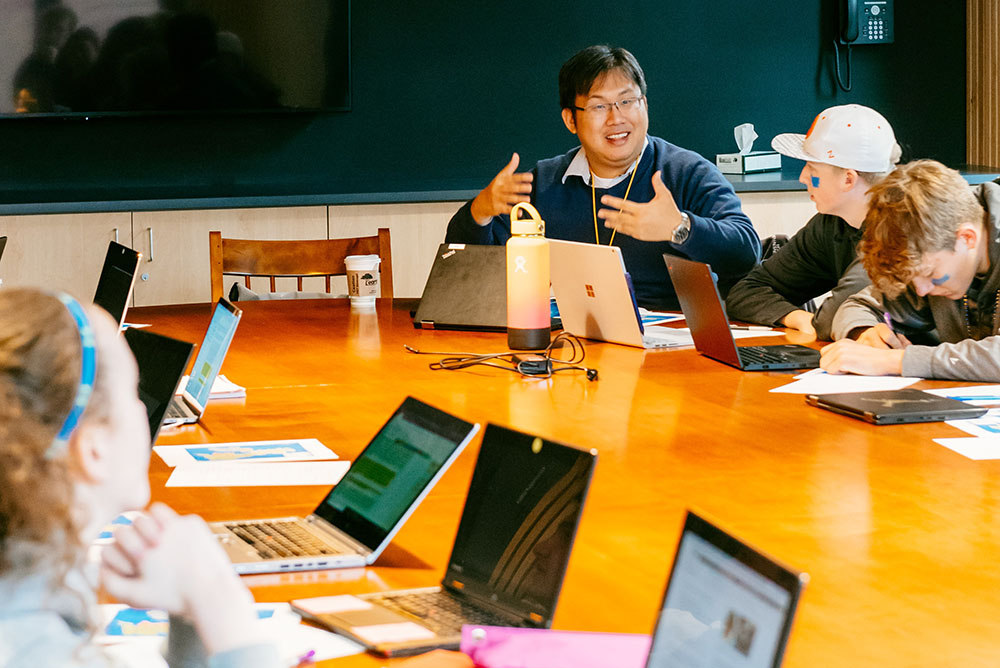
Insight: History and Social Science: New Medium, Same Critical Thinking and Wise Innovation
By Wen Yu Ho, 2020-21 Social Science Discipline Lead
Over 11 months into the EPSRemote experience, it seems an apt moment to look back at nearly a full academic year online and take stock of the pedagogy and instruction that has happened during this time. While substantial adjustments have unquestionably had to be made to adapt to shorter class times on Microsoft Teams, it is gratifying that so many instances of the same great teaching and learning that characterize history and social science classes here at EPS can still be easily identified despite not being able to be physically seated around the Harkness table in TALI-206.
Relatively quickly into EPSRemote, conversations around how certain parts of our new experience would stick around even when things went back to “normal” started emerging, as unexpected benefits came through. During the 10th Grade Model UN General Assembly session that all students participate in as a culminating experience each spring trimester, one long-standing challenge has been allowing as many students as possible to speak in a large, noisy setting. The chat feature on Teams elegantly solved that issue, allowing for multiple voices and opinions to be easily captured, leading to significantly greater audience participation than ever before. Indeed, this chat feature has basically permitted two similarly robust discussions to occur at the same time in the 12th Grade Democratic Theories class, doubling the scope of the conversation despite the shortened class time, as well as offering another window for students who sometimes find it too challenging to jump into a verbal discussion to contribute. Safe to say, chat on Microsoft Teams is here to stay.
Challenge frequently breeds innovation, and in the 7th Grade Historical Thinking 2 course, the need to adapt the Indigenous Peoples PPT assignment for the online classroom prompted the creation of several how-to videos to deliver instructions and expectations efficiently and effectively, particularly walking students through how the slides should be laid out. These videos could also always be referred to should anyone need a refresher. Meanwhile, the 5th Grade Introduction to Historical Thinking course has made use of another new innovation, namely the breakout rooms feature on Teams, for its recent First Peoples Project. Students have reported that the small groups allow for genuine collaboration and a safe environment where helpful feedback can be provided, crucial elements for building the genuine relationships that will carry the youngest members of our community through their EPS experience.
The absence of physical classrooms has also definitely not slowed the collaboration and integration that play a prominent role in the EPS history/social science experience, both among sections of the same course or with other disciplines. The second iteration of our revamped 9th Grade Humanities courses has been proceeding smoothly so far, with each course coming together at the end of the fall trimester for a culminating artifact sharing experience. COVID-19 was also not going to stop the annual 10th Grade revels in Medieval History, which featured the usual laughs and merriment. Indeed, collaboration has perhaps been a tad easier for the 11th Grade US History courses, given that there is now no need to take down and put back classroom walls to create joint class sessions. Instead, through the creation of a joint Teams group, teachers have been able mix and match groupings to constantly bring in new voices and process the recent earthshaking developments in this country’s history over the past year together.
As Discipline Lead this year, I feel humbled and honored to be working with a stellar group of educators whose sense of camaraderie, commitment to excellence and genuine desire to improve their craft has been palpable in each monthly discipline meeting. I look forward to the day when we can exchange laughs over breakfast together in the LPC once again, but until then, we should all continue to take pride in the robust, engaging and thought-provoking experiences we provide our students each and every day.

